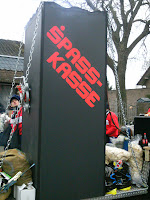When the period of Epiphany rolls around in the UK, the only part of it that we can generally commit to every year is Shrove Tuesday, in which we prepare for the Lent that some of us partake in by eating far too many pancakes. In Germany, things are done slightly differently. Yes, it's Karneval time!
For those of you unfamiliar with this particular festive season in Germany, Cologne carnival is kind of a big deal. People from all over the country head to the Rhineland, totalling over a million spectators lining the streets as floats and performers walk through the city: Rio de Janeiro style, only with slightly more clothes on. The origins are truly primitive: in prehistory, Teutonic tribes engaged in pagan orgies to celebrate the passing of winter, and today little has changed really.
I had hoped to make it to Cologne for at least one day, but it was not to be. The biggest parade happened on Monday, and although school was closed for five days to allow staff and pupils to take in the celebrations, it was just too cold for me to be standing around for six hours watching things go past. I'm not being wet either - temperatures did not rise above freezing all day, and the wind chill meant it felt around -10C.
Pictured: a better man than I.
What I did instead was to join my host family and head to Kirchherten, which is apparently the scene for the second biggest parade in the area on the day. It turned out to be the right decision: three hours in the cold as opposed to the entire day, a lower risk of being crushed to death and car travel to and from the event with the promise of a warm living room at the end of it.
And so the parade began. This particular one was more modest than its big-city counterpart, but made up for it in enthusiasm. The concept is simple enough: each district of the town is allowed a certain amount of money by the council to set up a float, and is given a theme to follow. The people who walk with or ride on the float have to register in the previous year, because if there's one things the Germans love, it's being efficient ahead of time (rail network excluded). Then they all chip in for bags full of sweets, crisps, small toys and flowers that they throw at spectators who shout "Kamelle." Everyone turns up prepared with the German equivalent of a Bag For Life, and as far as I could see, everyone had filled their bag by the end of it. It's also an opportunity for people in the parade to give slightly larger presents to their friends or neighbours - at one point I saw a Pringles can and bouquet of flowers being passed carefully down, and other people stopped off with bottles of spirits for a celebratory shot with friends. Mostly of Waldgeist, which according to Wikipedia is flavoured with the herb woodruff. Not that you'd notice over the burning sensation. The effort put in is impressive, and we witnessed an army of Huns, hippies, punks, and the local film society dressed up as Charlie Chaplins.
Always a brave move going for that moustache in Germany.
Aside from community spirit, these parades serve two other purposes: advertising and satire. The first is straightforward enough: companies faced with employees allowed a day or two off work take the opportunity to enter a float bearing their logo and send those workers to run it. They get an advert seen by everyone present, the employees have fun, everyone gets a good deal.
Sparkasse bank in Kirchherten, for example, displayed a safe bearing the words "Spasskasse" (fun box). I'm still not sure if this is an example of German humour or just proof that bankers the world over don't exactly help their own image.
The satirical side of things is altogether weirder, and judging by the TV coverage I saw of the Cologne and Dusseldorf events, it takes up more than half of the big parades. Both global and national affairs are covered:
Today, it essentially consists of political cartoons rendered in 3D and blown up to huge proportions, but the tradition goes back a long way. In the Middle Ages, people attended mass dressed as animals, reading out prayers in animal noises and thereby subverting the power of religious leaders over their subjects. In the 1820s, Karneval was used as an opportunity to attack Napoleon - little has changed since then. In an interesting twist in 2012, a group of Turkish-Germans released a press package stating they wanted to form a breakaway Karneval based on Muslim values, playing up the fact that Teutonic orgies aren't for everyone.
Overall, my lasting impression of Karneval was that it served to remind me how foreign Germany can seem at times. For the entirety, people in the area were celebrating the fact that they come from the Cologne area, and I just can't imagine that happening in the UK - yes, we do well in terms of national pride, but dedication to regions like that doesn't happen, especially not in the same manner as the friendly rivalry between Cologne and Dusseldorf, for example. Maybe this is a reflection of the fact that Germany has spent too much of its existence as a divided country; forming from a group of states in just 1871 and then being split for most of the lifetime of a lot of its current citizens. Germany as a whole holds no particular meaning to a lot of people, so they resort instead to their area in search of an identity, failed by their national government for too long. As a concept, that's pretty sad. Yet things like Karneval are a reminder that nobody is too bothered. Not bad music either.
TJGreenwood.


